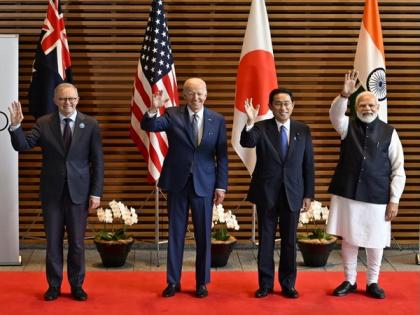Building like-minded coalition crucial to counter the assertive approach of China in Indo-Pacific: Report
By ANI | Published: February 20, 2023 12:40 PM2023-02-20T12:40:24+5:302023-02-20T18:15:02+5:30
: A new report from the Danish Institute for International Studies states that despite the diversity of their individual ...

Building like-minded coalition crucial to counter the assertive approach of China in Indo-Pacific: Report
: A new report from the Danish Institute for International Studies states that despite the diversity of their individual strategies, all G-7 countries are committed to the rule of law and have taken the lead in Western coalition-building efforts in the Indo-Pacific since 2021, as reported by Voices Against Autocracy (VAA).
VAA delivers uncensored information related to China, Tibet, Xinjiang, North Korea and Uyghur, where the rights of people have been suppressed and media is under complete censorship.
NATO Secretary General Jens Stoltenberg recently visited South Korea and Japan to convey the message that transatlantic and Indo-Pacific securities are interconnected.
As per the VAA report, the Western defence alliance emphasized on democracies working together to protect the international rules-based order, united by the systemic challenges posed by the People's Republic of China. Although Stoltenberg didn't label China as an adversary, he acknowledged that its coercive policies have consequences for both Indo-Pacific and Euro-Atlantic security.
The Indo-Pacific region has become a focus of attention for many observers, who are watching how the China-US great power competition is changing the security architecture, leading to new regional groupings such as the Quad and AUKUS.
However, less attention has been paid to the role of identity-forming processes in the Indo-Pacific region. NATO defines "like-mindedness" as sharing basic political values and principles, which has become an important criterion for Western countries as they expand their engagement in the region and distance themselves from China.
The G-7 countries have adopted a strong common stance as a coalition of like-minded states, promoting a narrative of a Free and Open Indo-Pacific that is inclusive and based on the rule of law, human rights, democratic principles, and peaceful dispute resolution.
They have depicted China as the main challenge to this vision. The Quad countries (Australia, India, Japan, and the United States) have also pushed for building a coalition of like-minded nations in the Indo-Pacific and promoting liberal values through initiatives like the Open Societies Statement and have advanced in their summits and through declarations promoting liberal values.
Through Joint statements, the G-7 countries have made it clear that China is viewed as the main challenge to their vision of a "Free and Open Indo-Pacific." The group has called on China to uphold its commitments to the rules-based international order, respect human rights, and avoid the use of force in settling disputes.
The formation of this coalition will shape the geostrategic landscape of the region by influencing strategic choices about security assistance, geo-economic partnerships, and infrastructural/technological connectivity, reports the VAA.
The Biden administration has been a key player in the ongoing situation, with President Biden himself addressing the ideological conflict between democracies and autocracies and initiating the Summits for Democracy (the first held in December 2021 and the second scheduled for March 2023).
China's government has criticized the US-led Western coalition as an attempt to form small cliques under the guise of "freedom and openness." However, China is facing the possibility of facing an increasingly united Western bloc that seeks to bring Indo-Pacific countries into their sphere of influence, which could push China to the sidelines despite its strong economic ties to many countries.
In light of this, Beijing has seemingly adopted a more conciliatory approach. It remains to be seen whether this change in tactics will be successful in breaking the alignment of Western countries in the Indo-Pacific.
( With inputs from ANI )
Disclaimer: This post has been auto-published from an agency feed without any modifications to the text and has not been reviewed by an editor
Open in app